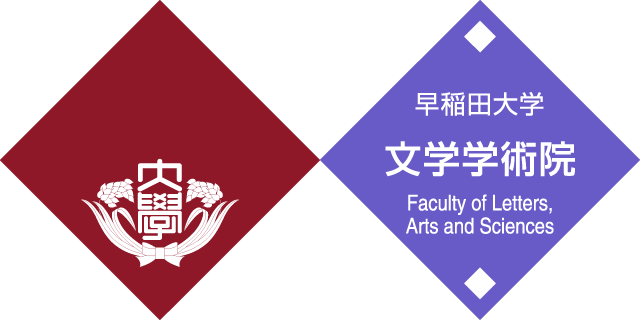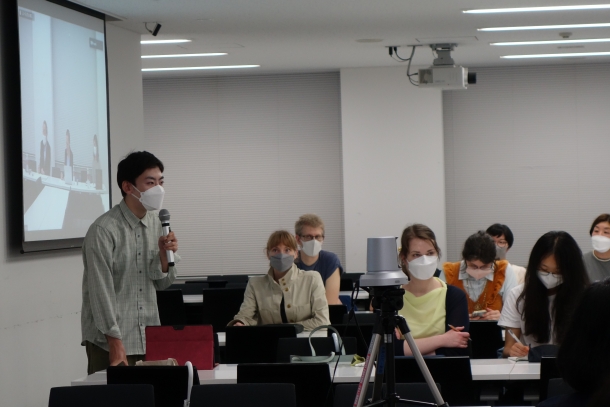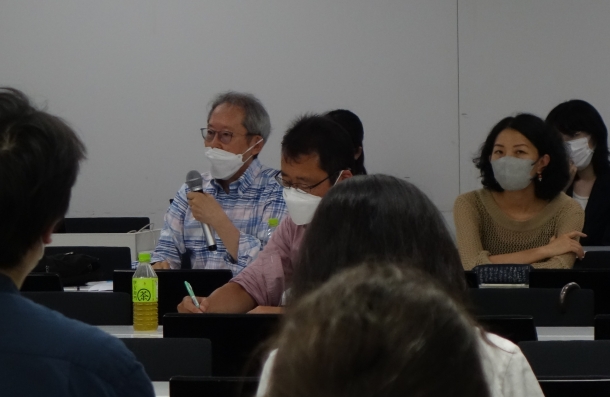- News
- Event Report “The “More-than-Human” and Ecocultural Perspectives on Premodern Japanese Literature: Current Approaches and Experiences of Teaching in Canada”
Event Report “The “More-than-Human” and Ecocultural Perspectives on Premodern Japanese Literature: Current Approaches and Experiences of Teaching in Canada”
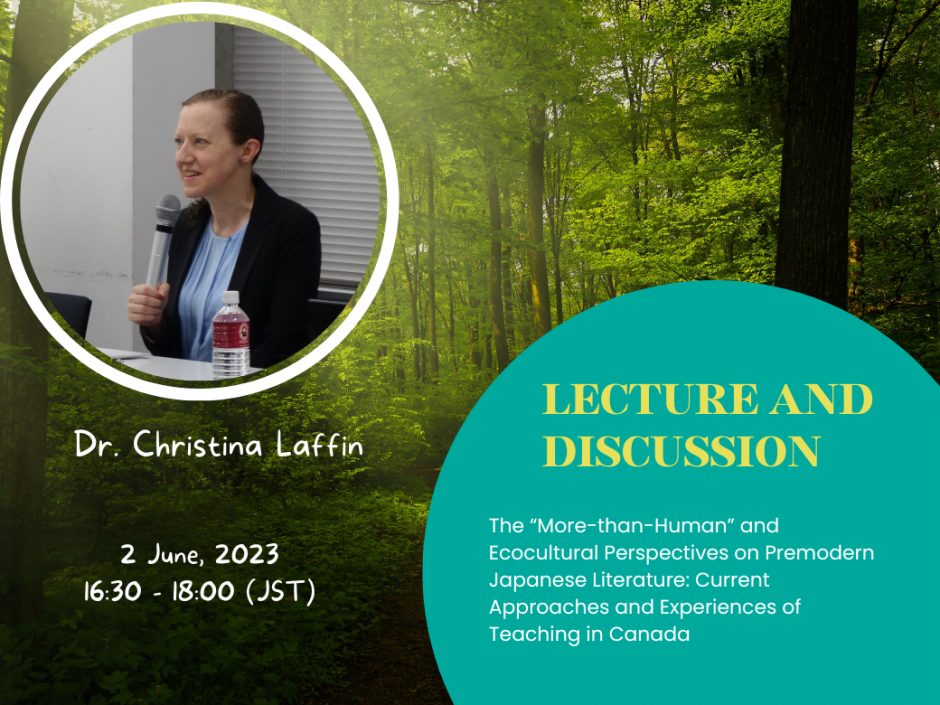
- Posted
- Fri, 30 Jun 2023
Dr. Christina Laffin, Associate Professor at the The University of British Columbia and Visiting Associate Professor at Waseda University, gave a lecture and discussion “The “More-than-Human” and Ecocultural Perspectives on Premodern Japanese Literature: Current Approaches and Experiences of Teaching in Canada” on June 2, 2023. The lecture was held at Conference Room 1, Building 33, Toyama Campus, Waseda University in a hybrid format with Zoom. This lecture addressed the issue of how research and education in Japanese literature, particularly pre-modern Japanese literature, can be made relevant to issues of climate and sustainability, which was raised in the June 1, 2022 lecture “Teaching about/with/through nature and Japanese literature” by Dr. Christina Laffin. Dr. Laffin presented a fresh and fascinating vision of new possibilities for the future of pre-modern Japanese literature research and education, drawing on recent research, theory, and practice in Canadian university education over the past year.
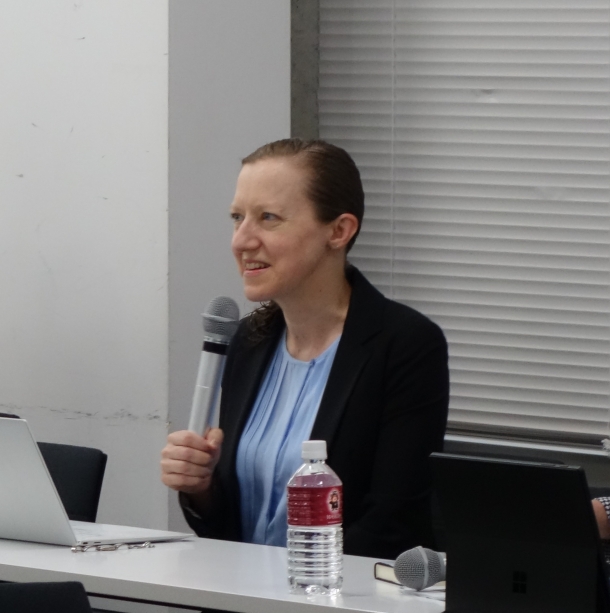 The lecture began by reviewing the term ecocriticism and the history of the emergence of the field of environmental literature as a field of study, and then introduced how the young generation today has many concerns about climate and ecology, and how the students have a high awareness of the issues and desire to learn about climate and sustainability issues, which led to the implementation of this concept in the classroom. Dr. Laffin noted Kyle White’s point that awareness of the current global environmental crisis can sometimes lead to justification of colonization, and reminded the audience that we must be aware of the perspectives and positions from which we approach these issues.
The lecture began by reviewing the term ecocriticism and the history of the emergence of the field of environmental literature as a field of study, and then introduced how the young generation today has many concerns about climate and ecology, and how the students have a high awareness of the issues and desire to learn about climate and sustainability issues, which led to the implementation of this concept in the classroom. Dr. Laffin noted Kyle White’s point that awareness of the current global environmental crisis can sometimes lead to justification of colonization, and reminded the audience that we must be aware of the perspectives and positions from which we approach these issues.
Dr. Laffin also pointed out that the land in Vancouver, Canada, where she teaches, was not “given” to them by the Musqueam First Nation, and that it is important for Canadian educational institutions to continue to recognize and consider “truth” moving toward “reconciliation.” She also explained the necessity of knowing the land, its history, ongoing Indigenous practices, stories and traditions, and its environment and “nature.” In the classes, she reported that the students interacted with objects, learned practically using their bodies, and “experienced” pre-modern Japanese literature through outdoor learning.
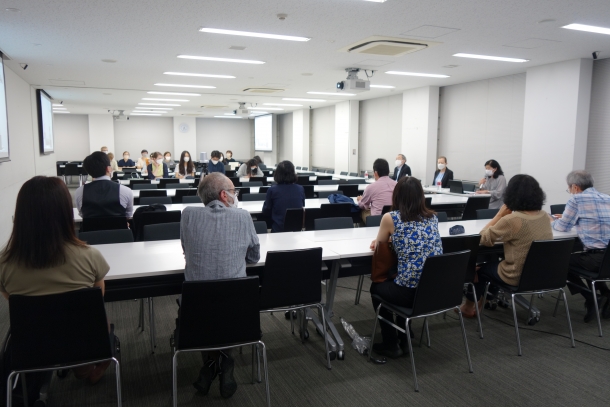
In the next part of her presentation, Dr. Laffin raised the question: how might we approach what has been called “nature” in literary education and research? In contrast to the conventional view of nature as a dichotomous concept contrasting nature versus culture and humans versus plants and animals, she presented a new perspective of the “More-than-Human,” which transcends the conventional boundaries and frameworks of nature and humans, along with the claims of contemporary “Ecoculture/ecocultural” research: Ben Bunting’s redefining of “nature,” Donna Haraway’s concept of “naturecultures,” Tema Milstein’s proposal of “humanculture,” W.J.T. Mitchell’s proposal of the term “humanimal,” and others.
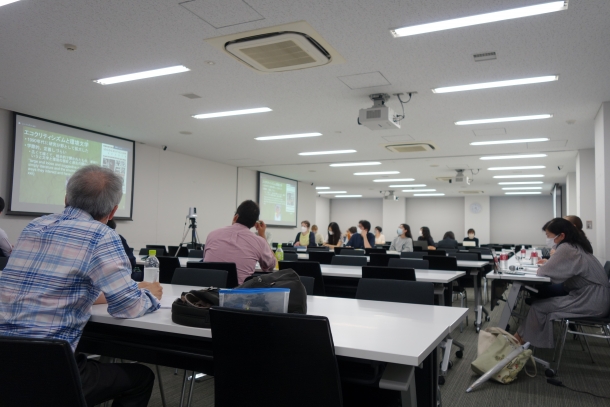
Finally, the lecture discussed how research on classical Japanese literature has tended to understand and convey the environment and the world, and how we can grasp and think about the self within ecology in the present, drawing from the concept of queer ecology advocated by Nicole Seymour. She discussed the possibility of developing critical readings (including queer readings) that take us beyond “normative reading” and notions of “legitimacy,” using the example of “The Lady Who Loved Insects” in the Heian-period tale Tsutsumi Chūnagon Monogatari. She introduced aspects of the story that lend themselves to a queer reading, considering the narrative and various readerly perspectives based on this tale of a peculiar protagonist who loved caterpillars. She also referred to how gender and sexuality are approached across the multiple English translations of “The Lady Who Loved Insects.”
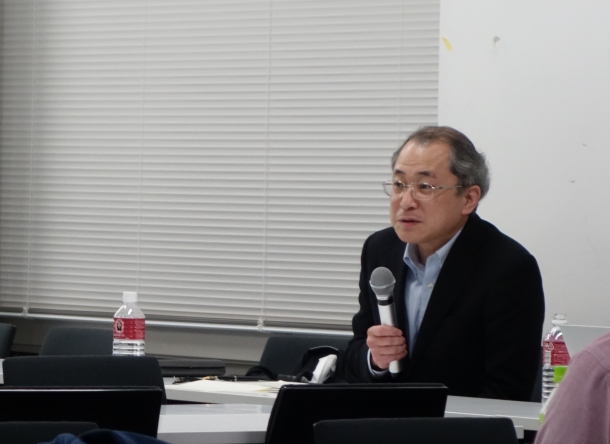
Following the lecture, Hidenori Jinno, Professor, Waseda University made comments from the standpoint of literary research on Heian-period tales. Professor Jinno first discussed how Japanese literature has produced representations of the “More-than-Human,” the key word of the lecture, by introducing a scene from the Usugumo chapter of The Tale of Genji. In the scene, the protagonist Genji laments the death of Lady Fujitsubo and composes a poem superimposing the dull colored light clouds on the color of his own mourning clothes. Jinno also introduced research by literary scholar Masaru Kusano examining how people began to compose poems by comparing the figure of wild geese with themselves in waka poems of the Heian period.
Prof. Jinno also explained “how to relate to heterogeneity” as described in “The Lady Who Loved Insects,” highlighting the response of the character Taifu no Kimi as an example of perspectives on behavior and modes of existence found within the work. He also mentioned the rapid increase of the word “nature” in the study of modern Japanese literature, and confirmed that the issues raised by Dr. Laffin provide an important perspective in the study of Japanese literature.
His comments were followed by a discussion with the participants. The graduate students also had lively questions and opinions, including Professor Haruo Shirane of Columbia University, who gave a lecture “Japan, Mountains, and Culture: Rethinking Environmental Humanities” at Waseda University just a week ago, and Professor Emeritus Kazuaki Komine of Rikkyo University, who has been promoting various projects in recent years, focusing on environmental and landscape literature.
With Dr. Laffin, we had a very broad and deep discussion on various essential issues surrounding literary research, such as how to deal with the term “nature” and other technical terms, how to understand personification, and how waka poems should face the truth and the real. It was a meaningful time for everyone from graduate students and early career researchers to seasoned scholars to share a wealth of information and awareness of issues regarding the role and future possibilities of research and education in pre-modern Japanese literature.
The lecture was sponsored by the Global Japanese Studies Model Unit, Waseda University Top Global University Project and the Ryusaku Tsunoda Center of Japanese Culture.
(Written by Kimiko Kono)
Event Overview
- Date: June 2, 2023
- Time: 16:30 – 18:00 (JST)
- Venue: Waseda University, Toyama Campus, Building 33, 3F Conference Room 1 and Zoom meeting
- Lecturer: Christina Laffin (Associate Professor, The University of British Columbia)
- Language: Japanese (English and Japanese for the Q&A session)
- Participation is free of charge.
- Open to the public
- Tags
- Event Reports
